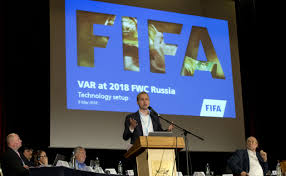The Federation of International Football Associations (FIFA) is very hopeful the next world cup would be devoid of controversies arising from decisions over field play situations by the intervention of technology.

Frozen screens, bendy offside lines and other technical glitches have made the Video Assistant Referee (VAR) system a frequent target of derision as the World Cup approaches.
Two years of testing ahead of the June 14 opening game have left Johannes Holzmueller, the head of FIFA’s Technology Innovation Department, ”sweating…because we were unsure if everything works perfectly.
”However now that we go into the World Cup we are quite sure that we will have the best setup that is possible at the moment,” said Holzmueller at a media conference.
But he refused to say the network of digitally-enhanced cameras overseen by experienced assistant referees would be fool-proof in time for the World Cup that kicks off in Moscow.
Ultimately, said Holzmueller, that ”it is technology. It can fail.”
Few doubt that following several controversial incidents recently. Last weekend a technical glitch allowed an offside goal to stand, deciding the national title in Australia.
”Cameras were frozen. The feeds were no longer available. They tried the best in that situation but could not find one angle,” Holzmueller said.
”If they do not have all the feeds or the specific angle to say ‘hey, I am 100 percent sure, 100 percent convinced I would go for a clear offside’. If you cannot have that as a VAR, then of course you cannot tell the referee on the pitch.
”In this case it was a clear technology failure. We learned a lot from that.”
Last month in the Bundesliga, Mainz was awarded a penalty during half-time after its opponents had already left the pitch.
In Belgium last weekend, the Club Brugge vs. Anderlecht game started more than 15 minutes late because the VAR system was not ready.
In Italy in March, Lazio took issue with a number of decisions, prompting about 200 fans to protest outside the national football federation.
Holzmueller said that, in another incident, the digital line on the screen to decide offside was bendy rather than straight.
Live and learn and always have a back-up, said Massimo Busacca, director of refereeing at soccer’s ruling body FIFA.
”I say always we must be ready for a Plan B. Who is ready for Plan A only is not the top. Who is not expecting the unexpected cannot be top level,” Busacca said, suggesting technology must always be subservient to the referee.
”Only one decision at the next World Cup – only one – is enough to say: VAR was good to be introduced. The aim is not to achieve 100 percent calls for all decisions, only to avoid scandal.”
Kindly follow us on twitter:@AfricanVoice2







